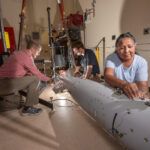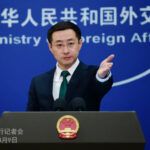Why Latin America matters at the Nuclear Security Summit
By Fissile Materials Working Group | February 16, 2012
It is a fact that nuclear terrorism is a global threat and has become a worldwide concern. But what is particularly frightening is that there is no clearly defined plan for securing all nuclear materials. According to the Nuclear Threat Initiative’s (NTI) Nuclear Material Security Index, there is no global consensus about what steps matter most in achieving nuclear security. Practices regulating the production, use, and security of weapons-usable nuclear materials are determined on a country-by-country basis. But getting to global consensus means regional — not just national — strength, and the Latin American region cannot afford to be an outside player. Latin America must have a strong, unified position to confront the nuclear terrorist threat and to enhance a nuclear security world order.
In the 21st century, nuclear issues are no longer restricted to a few nations. Since September 11, 2001, nuclear challenges have been increasingly understood as matters of global concern. Only multilateral cooperation can minimize the risk of a nuclear terrorist attack. After all, there is currently enough highly enriched uranium in the world to make more than 60,000 nuclear weapons; moreover, the level of security over this material varies dramatically. Should a terrorist acquire nuclear or radiological material, it is theoretically possibly for them to construct a crude nuclear weapon or radiological dispersion device right now.
Current political developments stress the need for international nuclear order and balance. Right now, the planet is confronted with: North Korean and Iranian nuclear programs, Israeli ambiguity on its nuclear capabilities, an unprecedented number of nations embarking on nuclear modernization plans, the perceived inability of the Nuclear Non-Proliferation Treaty (NPT) to achieve disarmament or to halt proliferation, Pakistan and India’s nuclear competition, the inability to pass a Comprehensive Test Ban Treaty, challenges confronting the International Atomic Energy Agency, and weak international oversight of nuclear material security. While the multitude of challenges facing the global nuclear regime can appear overwhelming, coordinated action among states and civil societies can forge progress on many fronts.
The Seoul Nuclear Security Summit in March will be a critical opportunity for states to improve global cooperation on nuclear terrorism prevention. Given that international terrorist networks move, communicate, and operate across international borders, all nations need to join together to ensure that there are no gaps in global nuclear security. This means that Latin America must be deeply linked with any nuclear security efforts established at the summit and play a very important role in advocating nonproliferation and disarmament, as well as strengthening the international nuclear order.
According to the NTI Nuclear Material Security Index, two classes of countries exist: those with and those without weapons-usable nuclear materials. (The index counts 32 nations with one kilogram or more of weapons-usable nuclear materials and 144 nations with less than one kilogram or no weapons-usable nuclear materials.) Behind this differentiation, there is a clear message: The world needs to move from “with” toward “without” weapons-usable nuclear materials. In Western nations, nuclear security has often been disconnected from discussions on disarmament and nonproliferation. However, all three are linked. In order to get buy-in from non-nuclear weapons states on nuclear security, many nations want to know that nuclear weapons states are living up to their end of the NPT.
Among Latin American countries, 22 out of 23 nations qualify as without weapons-usable nuclear materials. Argentina is the lone outlier. But while the region as a whole is doing well, individual countries in Latin America could still use some work: Being non-nuclear does not mean Latin America is non-problematic. Based on social factors like political stability, the pervasiveness of corruption, and whether or not the country is home to groups interested in illicitly acquiring nuclear materials, NTI rates Chile, Peru, and Cuba very highly; but Haiti, Venezuela, Belize, and Bolivia are rated the lowest in Latin America. In Central America and the Caribbean, Guyana, Honduras, and Suriname don’t fare very well, either; nor do Colombia, Ecuador, and Venezuela in South America. This is consistent with the Fund for Peace’s Failed States Index, which ranks all of those low-rated NTI nations in Latin America as in “alert” or “warning” for failed statehood. The Fund for Peace considers everything from poverty to the number of refugees, from vengeance-seeking groups to the legitimacy of the state, in making its determinations. That’s why enhancing state stability, combating corruption, and containing groups that could be interested in acquiring or trafficking nuclear material must be Latin America’s — and the world’s — priorities at the 2012 Nuclear Security Summit in Seoul.
Other important initiatives that should be endorsed by Latin American countries at the summit include:
- Promoting a new generation of regional leaders on nuclear security so that Latin America has more of a voice at global meetings.
- Pushing for greater participation at the summit by institutes and academic organizations with a Global South perspective on nuclear security, terrorist threats, nonproliferation, and disarmament.
- Proposing a regional working group to encourage a better understanding of nuclear security and its implementation as well as of UN Security Council Resolution 1540, which commits states to preventing the transfer or use of nuclear materials. Supporting the voice of civil society. Mobilizing the public is key to securing commitment from governments. Also, civil society in Latin America can play an important role in redressing misperceptions about nuclear threats: While there is consensus in support of tackling nuclear challenges, nuclear terrorism is not perceived as an urgent threat. Latin America needs to engage in a practical dialogue about the realities of nuclear safety and security — it needs to democratize the discussion of nuclear challenges.
- Advancing the idea of Latin America as a “fissile material-free” region.
It is important for Latin America to use its unique perspective to push for positive outcomes at the summit. Paradoxically, Latin American nations must not be totally focused on nuclear security at the summit. It is important to insist that, in the end, true nuclear safety will only be achieved through a global commitment to nonproliferation and disarmament.
Editor’s Note: This column was written by Rodrigo V. Alvarez, an international partner of the Fissile Materials Working Group. Alvarez is the executive manager of the Global Consortium on Security Transformation, based in Chile.
Together, we make the world safer.
The Bulletin elevates expert voices above the noise. But as an independent nonprofit organization, our operations depend on the support of readers like you. Help us continue to deliver quality journalism that holds leaders accountable. Your support of our work at any level is important. In return, we promise our coverage will be understandable, influential, vigilant, solution-oriented, and fair-minded. Together we can make a difference.
Topics: Columnists, Nuclear Weapons















